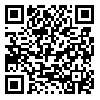Tue, Jul 16, 2024
[Archive]
Volume 10, Issue 3 (Summer-In Press 2024)
JCCNC 2024, 10(3): 0-0 |
Back to browse issues page
Download citation:
BibTeX | RIS | EndNote | Medlars | ProCite | Reference Manager | RefWorks
Send citation to:



BibTeX | RIS | EndNote | Medlars | ProCite | Reference Manager | RefWorks
Send citation to:
Fagbenro D A, Olasupo M O, Idemudia E S, Alausa S S. Mediating Effect of Self-Efficacy Between Personality Traits and Workplace Bullying of Nurses. JCCNC 2024; 10 (3)
URL: http://jccnc.iums.ac.ir/article-1-556-en.html
URL: http://jccnc.iums.ac.ir/article-1-556-en.html
Dare Azeez Fagbenro * 
 1, Mathew Olugbenga Olasupo2
1, Mathew Olugbenga Olasupo2 
 , Erhabor Sunday Idemudia3
, Erhabor Sunday Idemudia3 
 , Sulaiman Sikirulai Alausa4
, Sulaiman Sikirulai Alausa4 


 1, Mathew Olugbenga Olasupo2
1, Mathew Olugbenga Olasupo2 
 , Erhabor Sunday Idemudia3
, Erhabor Sunday Idemudia3 
 , Sulaiman Sikirulai Alausa4
, Sulaiman Sikirulai Alausa4 

1- Department of Psychology, University of Ilorin, Nigeria. , fagbenro.da@unilorin.edu.ng
2- Department of Psychology, Obafemi Awolowo University, Nigeria.
3- Faculty of Humanities, North-west University, South Africa.
4- Department of Psychology, Federal University of Oye, Ekiti State.
2- Department of Psychology, Obafemi Awolowo University, Nigeria.
3- Faculty of Humanities, North-west University, South Africa.
4- Department of Psychology, Federal University of Oye, Ekiti State.
Abstract: (281 Views)
Background: Past studies have been done on antecedents of workplace bullying but the nexus between personality traits, self-efficacy and workplace bullying is still given less attention in the extant workplace bullying literature. Therefore, the study examines the predictive role of personality traits on workplace bullying and also investigates the mediating effect of self-efficacy in the relationship between personality traits and workplace bullying among a sample of Nigerian nurses.
Methods: A descriptive, cross-sectional survey study was conducted among 371 nurses aged 20 to 58 years (Mean age = 39.12 years, SD = 8.31, ♀ = 305) through a purposive sampling technique in Ibadan, Nigeria in 2022. The subjects responded to the Negative Acts Questionnaire-Revised (NAQ-R), Big Five Inventory (BFI-10) and Generalized Self-Efficacy Scale (GSES). Data were analysed using Pearson Product Moment Correlation (PPMC) and Structural Equation Modelling (SEM) with IBM® SPSS® Amos™ 23. The hypotheses were tested at .05 level of significance.
Results: Among the personality traits, extraversion (β = -.313, p<.001), agreeableness (β = .371, p<.001), conscientiousness (β = .325, p<.001), and openness to experience (β = -.154, p<.001) predicted workplace bullying. Findings also revealed that self-efficacy (β = -.156, p<.05) predicted workplace bullying among nurses. Self-efficacy partially mediated the link between personality traits (agreeableness, and openness to experience) and workplace bullying (β = -.042, CI= .016, .074, p=.001) indicating that self-efficacy serves as a buffer to the experience of workplace bullying.
Conclusion: Self-efficacy enhancement training programs are suggested to be designed for nurses in order to make them proactive to any workplace-related bullying.
Methods: A descriptive, cross-sectional survey study was conducted among 371 nurses aged 20 to 58 years (Mean age = 39.12 years, SD = 8.31, ♀ = 305) through a purposive sampling technique in Ibadan, Nigeria in 2022. The subjects responded to the Negative Acts Questionnaire-Revised (NAQ-R), Big Five Inventory (BFI-10) and Generalized Self-Efficacy Scale (GSES). Data were analysed using Pearson Product Moment Correlation (PPMC) and Structural Equation Modelling (SEM) with IBM® SPSS® Amos™ 23. The hypotheses were tested at .05 level of significance.
Results: Among the personality traits, extraversion (β = -.313, p<.001), agreeableness (β = .371, p<.001), conscientiousness (β = .325, p<.001), and openness to experience (β = -.154, p<.001) predicted workplace bullying. Findings also revealed that self-efficacy (β = -.156, p<.05) predicted workplace bullying among nurses. Self-efficacy partially mediated the link between personality traits (agreeableness, and openness to experience) and workplace bullying (β = -.042, CI= .016, .074, p=.001) indicating that self-efficacy serves as a buffer to the experience of workplace bullying.
Conclusion: Self-efficacy enhancement training programs are suggested to be designed for nurses in order to make them proactive to any workplace-related bullying.
Type of Study: Research |
Subject:
General
Received: 2023/11/22 | Accepted: 2024/03/6 | Published: 2024/05/21
Received: 2023/11/22 | Accepted: 2024/03/6 | Published: 2024/05/21
Send email to the article author
| Rights and permissions | |
 |
This work is licensed under a Creative Commons Attribution-NonCommercial 4.0 International License. |

